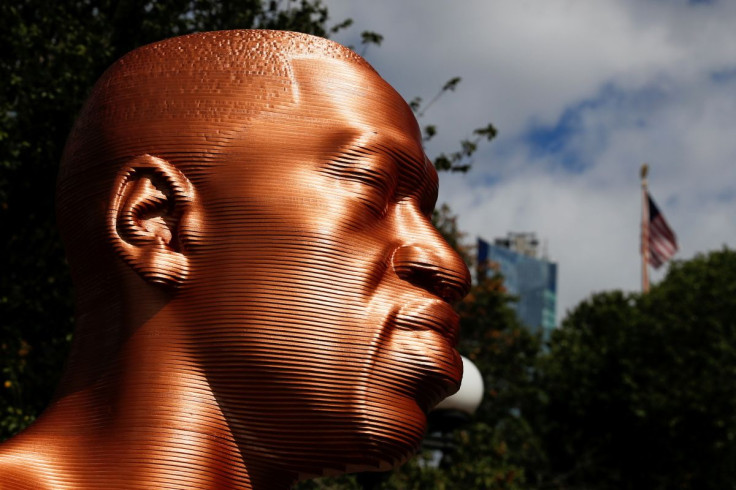George Floyd Restraint Seemed 'Reasonable,' Ex-officer Testifies

Pinning George Floyd face down on a Minneapolis road in a May 2020 arrest seemed reasonable in the moment, one of three former Minneapolis police officers on trial for violating the handcuffed Black man's civil rights testified on Monday.
Thomas Lane was the third of the three defendants to take the stand in his own defense at the federal trial in the U.S. District Court in St. Paul, charged with denying Floyd's right to receive medical aid once in police custody.
Answering questions from his lawyer Earl Gray, Lane told the jury how he had called over the radio for an ambulance after seeing Floyd's mouth bleeding from his struggle with Lane and another officer trying to get him in the back of a police car.
He became emotional as he recalled helping Floyd onto a stretcher and seeing Floyd's face several minutes after he fallen unresponsive beneath Lane and two other officers.
"He didn't look good," Lane said, his voice beginning to waver.
Co-defendants Tou Thao, 36, and J. Alexander Kueng, 28, took the stand last week to say they deferred to the authority of Derek Chauvin, the most senior officer at the scene. Lane, who was on Floyd's ankles, and Kueng, who was on Floyd's thighs, were rookies only a few days out of training. Thao stood a few steps away from Floyd in a hands-off role he has described as being a "human traffic cone."
Cellphone video of Chauvin, who is white, kneeling on Floyd's neck for more than nine minutes while Floyd begged for his life triggered huge protests against racism and police brutality. Chauvin was convicted in a separate state trial last year of murdering Floyd and sentenced to 22-1/2 years in prison, and in December he pleaded guilty to the federal charges of violating Floyd's civil rights.
Prosecutors have said the officers have a duty of care to anyone in their custody, and the three men breached their training and common sense in not doing more to help Floyd.
Lane, 38, can be heard on body-worn camera videos asking his colleagues if they should roll the prone Floyd onto his side, something officers are trained to do to avoid positional asphyxia.
Chauvin, 45, rebuffs the suggestion, and continues to kneel on Floyd's neck as Floyd falls motionless while bystanders scream at the officers to check his pulse.
"OK, I suppose so," Lane recalled responding. "It just seemed reasonable at the time. This guy is out of control." He said he believed the ambulance would be "here any minute."
He said he was unable to see Floyd's face for the entire nine-minute restrain. Lane got in the back of the ambulance and performed cardiopulmonary resuscitation on Floyd under a parademic's instruction.
Prosecutors have previously called medical experts who said Floyd would almost certainly had lived if rolled on his side once he had been restrained.
In cross examination by a prosecutor, Lane said he was not concerned about positional asphyxia when he suggested rolling Floyd onto his side.
"I just wanted to get a better assessment of him," he said.
The jury was due to hear closing arguments on Tuesday before beginning deliberations.
Thao and Kueng face an additional count of violating Floyd's rights in their role of police officers by failing to intervene to stop Chauvin's use of excessive force.
Both have said they assumed Chauvin knew what was he was doing from his nearly two decades on the force and did not realize the force was excessive.
Minneapolis Police Department fired all four officers.
"I found out I was terminated the next day in a Subway parking lot," Lane said, referring to the chain of sandwich stores. "I read a news article. That's how I found out I got fired."
© Copyright Thomson Reuters 2024. All rights reserved.





















